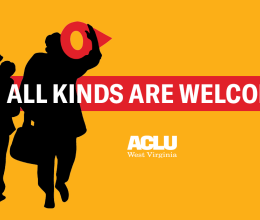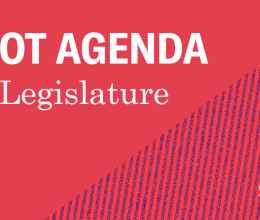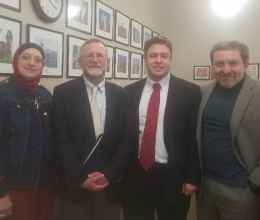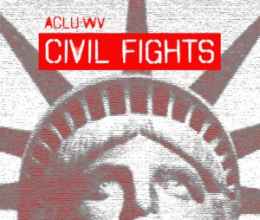This week on Civil Fights, Jamie and Noah give a legal update on Donald Trump’s Muslim Ban and which parts of it are now being enforced, following the Supreme Court’s intervention.
Donald Trump has tried to ban people from the predominantly Muslim countries of Iran, Syria, Yemen, Libya, Sudan, and Somalia from entering the United States. (Iraq was included in the first iteration of the ban, before it was removed for Trump’s second try.) This attempt to stop Muslim people from entering our country is shameful, bad policy, and unconstitutional. For a video of Mr. Trump talking about his intention to ban Muslims, click here.
If you are from one of the targeted countries and need legal assistance, please send an email to mailto:[email protected] and a legal professional will get back to you.
Donald Trump issued the first Muslim Ban Executive order on January 27 (“Muslim Ban 1.0”). By February 3, a federal court had issued a nationwide injunction, effectively putting it on hold. Shortly thereafter, the Trump administration announced they were rescinding the order and issuing a new one.
The second Muslim Ban Executive Order (“Muslim Ban 2.0”) did many of the same things as the first. It banned people from 6 of the 7 countries mentioned in the first order. It, too, was put on hold by the courts. (If you want more detail on the timeline of the executive orders and the litigation, this is a pretty good summary.)
On June 26, the Supreme Court allowed parts of Muslim Ban 2.0 to go into effect, but in a pretty limited way. The Order can only be applied to you if:
- You were outside of the U.S. on June 26, 2017;
- You did not have a valid visa at 5:00 pm EST on January 27, 2017; and
- Did not have a valid visa on June 29, 2017.
This means the order does not apply to you if:
- You are a U.S. citizen;
- You have a bona fide relationship with a person or entity in the U.S.;
- You were in the U.S. on June 26, 2017;
- You had a valid visa at 5:00pm SET on January 27, 2017 or on June 29, 2017;
- You are a lawful permanent resident of the U.S.;
- You are an asylee or refugee following-to-join-spouse or child;
- You were admitted or paroled into the U.S. on or after June 26, 2017;
- You have a document other than a visa that permits you to travel to the U.S. and seek entry that was valid on June 29, 2017 (i.e., advance parole);
- You are traveling on a diplomatic visa;
- You have been granted asylum, have already been admitted as a refugee, were granted a withholding of removal, advance parole, or protection under the Convention Against Torture;
- You’re a dual citizen and traveling on the passport of a country not covered by the ban.
The following types of family relationships are considered bona fide family relationships (after the Supreme Court had to step in and tell Trump he couldn’t ban grandma:
- Parents, spouses, fiancés, daughters, sons (including daughters-in-law & sons-in-law), siblings (whether whole or half, including step-siblings), grandparents, grandchildren, aunts, uncles, nieces, nephews, cousins, brothers-in-law, sisters-in-law.
And some examples of bona fide relationships with entities include:
- I visa applicant employed by a foreign media company that has a new office in the U.S.
- Students who have been admitted to U.S. educational institutions.
- Workers who have accepted offers of employment in the U.S.
- Lecturers invited to address a U.S. audience.
The Afghan robotics team Jamie mentioned has a pretty incredible story. Check it out!
And just FYI, people from these targeted countries have killed a total of zero Americans in terrorist attacks on U.S. soil since 1975.
If you are from one of the affected countries and you’re in or traveling to West Virginia, file a complaint on our website or send an email to [email protected].
We are also working on a powerpoint that goes through the Muslim Ban litigation and what it means for people from the effected countries—stay tuned!
A huge thanks to everyone who made this possible, especially our audio editors and masterers Bryan Deziel and Pat Gilroy, and Pat Gilroy and Jeremy Galanes of Titans of Punk for the original music.
If you like the podcast or just want to help the ACLU-WV, you can contribute to the ACLU-WV by clicking here.
<p><iframe style="border: none; min-height: 265px; max-height: 320px; max-width: 558px; min-width: 270px; width: 100%; height: 100%;" src="https://www.acluwv.org/en/%3Ca%20href%3D"https://cast.rocks/player/8054/2.-You-Can-t-Ban-Grandma.mp3?episodeTitle=2.%20You%20Can">https://cast.rocks/player/8054/2.-You-Can-t-Ban-Grandma.mp3?episodeTitle...'t%20Ban%20Grandma&podcastTitle=Civil%20Fights&episodeDate=July%2030th%2C%202017&imageURL=https%3A%2F%2Fcast.rocks%2Fhosting%2F8054%2Ffeeds%2FAPOR4.jpg&itunesLink=https%3A%2F%2Fitunes.apple.com%2Fus%2Fpodcast%2Fcivil-fights%2Fid1238032447%3Fmt%3D2" width="300" height="150"></iframe></p>





